What Is CBD?: Potential Benefits, Uses, and Safety Insights
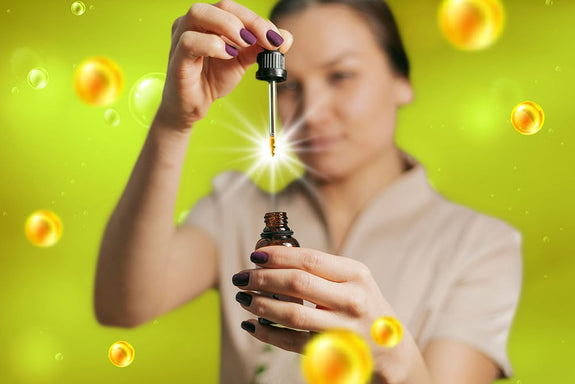
As we navigate this age of wellness and self-care, “What is CBD?” has emerged as a trending keyword phrase in search engines.
Known for its connection to the cannabis plant, CBD, or cannabidiol, has often been misunderstood due to its controversial origins.
However, with a wave of research and anecdotal evidence highlighting its potential benefits, the narrative around CBD is rapidly changing.
From anxiety and depression relief to pain management and potential applications in neurological disorders, CBD is making a name for itself in the health and wellness landscape as a potential form of alternative medicine.
But what exactly is CBD? How is it derived, and what are the potential benefits and risks associated with its use?
Key Takeaways
- CBD is a non-psychoactive compound sourced from either hemp or marijuana with potential health benefits, legally distinguished from THC due to its lack of intoxicating effects.
- Potential therapeutic applications of CBD include anxiety and depression relief, pain management, and treatment of neurological disorders, though more clinical research is needed to fully confirm its efficacy and safety.
- Various forms of CBD products are available, including Full-Spectrum, Broad-Spectrum, and Isolate, with modes of consumption impacting onset and duration of effects; appropriate dosing depends heavily on individual factors and requires careful adjustment.
Understanding CBD: Origins and Composition

The Definition of CBD
CBD, also known as Cannabidiol, is a natural compound that comes from the Cannabis Sativa plant. It is one of over 100 cannabinoids found in the plant. Unlike THC (tetrahydrocannabinol), another major active cannabinoid in cannabis, CBD does not induce a euphoric state, making it an attractive option for those seeking potential therapeutic benefits without the “high” associated with marijuana use.
Cannabis Sativa Plant
The Cannabis Sativa plant, native to Eastern Asia, is a remarkable herbaceous plant that has been cultivated globally for its diverse benefits. It is a member of the Cannabaceae family and is known for yielding both hemp and marijuana. It is the genus of the plant.
The plant is rich in cannabinoids, chemical compounds that interact with our bodies’ endocannabinoid system. This system is a key regulator of diverse physiological processes such as mood, pain sensation, and immune response.
CBD is one such cannabinoid found in abundance in the Cannabis Sativa plant, and it has been studied for its potential health benefits, such as reducing anxiety, alleviating pain, and improving sleep.
With CBD now being legal in many places, more human studies are being performed and more consumers can now access the various benefits of these products.
Cannabidiol (CBD) vs. Tetrahydrocannabinol (THC)
CBD and THC are two primary active compounds or cannabinoids found in cannabis. However, they are distinguished by their effects on the body.
While THC is known for its psychoactive properties, which induce a “high” feeling, CBD does not bind with the same affinity to cannabinoid receptors in the brain and hence does not induce psychoactive effects.
This difference makes CBD more suitable for potential therapeutic purposes, including pain relief, anxiety reduction, and improved sleep.
Notably, CBD’s interaction with the endocannabinoid system is complex and continues to be researched to further comprehend its potential therapeutic effects.
Extraction Methods
The quality and purity of CBD are significantly influenced by the extraction methods employed. The primary extraction methods include CO2 extraction, ethanol extraction, and olive oil extraction.
CO2 extraction, known for its precision, involves the use of pressurized carbon dioxide to extract CBD from the cannabis plant. This method yields high-quality and pure CBD oil but requires sophisticated equipment and expertise, making it a more costly option.
The ethanol extraction process involves the use of the Soxhlet technique, facilitating a rapid extraction with minimal residue, making it suitable for smaller batches of cannabis oil.
The olive oil extraction method combines olive oil with CBD-rich plant material, followed by heating the mixture to extract the CBD into the oil.
The choice of extraction method can significantly impact the quality of CBD products, influencing their potential benefits and safety.
At Sunday Scaries, we use Cryogenic Ethanol Extraction, which is the best form of extraction based on this Comparative Study in the National Library of Medicine which states "efficient cannabis biomass extraction can increase yield while reducing costs and minimizing waste. Cold ethanol extraction was evaluated to maximize yield and concentrations of cannabinoids and terpenes at different temperatures."
Health Benefits and Potential Applications
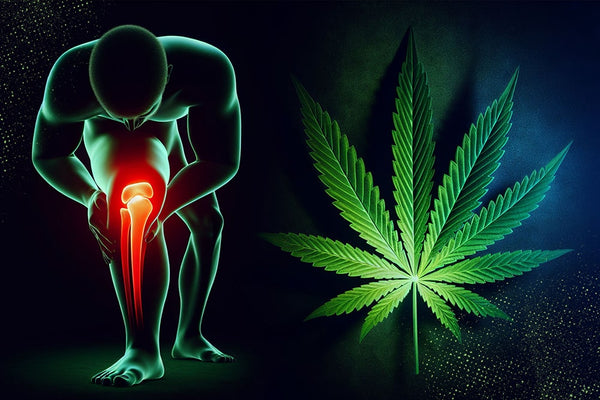
Potential health benefits of Cannabidiol, or CBD, under investigation include relief from anxiety and depression, pain management, and treatment for neurological disorders. By interacting with serotonin receptors in the brain, CBD oil may help alleviate symptoms of anxiety and depression. In fact, the health benefits of CBD are becoming more widely recognized and researched.
The plant has been relatively unstudied since the Marihuana Tax Act of 1937 which bastardized cannabis and prevented it from being researched in government labs and universities. Since the 2018 Farm Bill legitimized hemp and since the recreational and medical marijuana legal statuses have changed in many states, more research and clinical trials are now underway.
Anxiety and Depression Relief
Mental health conditions, such as anxiety and depression, can have a debilitating impact on an individual’s life.
CBD oil has shown promising potential in alleviating symptoms of these conditions by interacting with serotonin receptors in the brain. According to this study called Cannabidiol in Anxiety and Sleep: A Large Case Series, "Anxiety scores decreased within the first month in 57 patients (79.2%) and remained decreased during the study duration."
Empirical research indicates that CBD may be beneficial in reducing anxiety and enhancing depressive symptoms. However, when selecting a CBD product for anxiety relief, it is important to carefully consider the following factors:
- Method of consumption
- Desired effects
- Dosage
- Quality of the product
Taking these factors into account will help ensure that you choose the most suitable CBD product for your needs.
It is recommended to consult with a healthcare professional, especially if you have underlying health conditions. This is because CBD may interact with other medications and CBD products in general lack preclinical evidence and have not undergone human trials in a scientific setting.
Chronic Pain Management
Pain is a universal experience and managing it effectively can significantly improve quality of life. CBD has shown potential in this regard, by reducing swelling and interacting with neurotransmitters to alleviate body aches.
Research has indicated that specific CBD dosages have been associated with notable enhancements in pain and physical function, particularly in muscle tightness.
According to a study on chronic pain called Cannabidiol as a Treatment for Chronic Pain: A Survey of Patients’ Perspectives and Attitudes "overall, participants report that CBD is a good treatment option [“Agree” (20.9%), “Strongly Agree” (50.2%)]"
When surveyed about what health issues CBD oil has helped with, the most frequently reported conditions were back pain (67.3%), nerve pain (46.7%), and neck pain (44.7%).
Finally, the study revealed that effects of CBD on serious pain conditions "seem to be context specific, with no effect on pain shown in patients with Crohn’s disease, and pain-relieving effects reported for pain associated with Multiple Sclerosis, spinal cord injury, brachial plexus injury, limp amputation, peripheral neuropathy, and fibromyalgia."
It is essential to recognize that current research to definitively support the use of CBD for pain management is limited, necessitating more high-quality randomized clinical trials to verify CBD’s efficacy in pain treatment. So if you're looking for a cure all for cancer pain, joint pain or rheumatoid arthritis, cannabidiol extracts sold online may not be effective and you should consult a doctor prior to using them.
Neurological Disorders
In terms of neurological disorders, CBD, specifically through the prescription drug Epidiolex, has received approval for the treatment of specific types of epilepsy and tuberous sclerosis, showcasing its potential in managing neurological conditions.
Epidiolex is FDA approved after its parent company, GW Pharmaceuticals, conducted a controlled trial on the drug with numerous human studies.
CBD is also being studied for the potential protective effects against neurological disorders like Parkinson’s disease, Alzheimer’s disease, and multiple sclerosis. However, the current state of research on CBD’s use in neurological disorders is still in the infancy stages. While studies indicate potential beneficial effects, additional clinical studies are required to confirm these benefits fully.
Prescription medications like Epidiolex can serve as a safe and effective treatment in severe medical conditions, while over-the-counter CBD products like Sunday Scaries are better suited for stress relief, sleep aid and minor health issues.
FDA Warning: The statements regarding these products have not been evaluated by the Food and Drug Administration. These products are not intended to diagnose, treat, cure, or prevent any disease. Always consult with a healthcare professional before starting any new dietary supplement, including CBD products. Information and statements made are for educational purposes and are not intended to replace the advice of your healthcare provider.
CBD Safety and Side Effects

Despite its general safety, CBD is not devoid of potential adverse effects. Some users may experience dry mouth, drowsiness, and low blood pressure. Furthermore, CBD can interact with other medications, potentially altering their efficacy and side effects.
Special precautions should be taken when using CBD, especially by pregnant and breastfeeding women, individuals with Parkinson’s disease, and those on certain medications.
Common Side Effects
While CBD is generally well-tolerated, some users may experience common side effects such as dry mouth, drowsiness, and low blood pressure. CBD can induce drowsiness through its sedative properties, and it can lead to a decrease in blood pressure by reducing resting blood pressure and the blood pressure response to stress, relaxing blood vessels, and lowering cortisol levels in the body.
Drug Interactions
CBD could potentially interact with certain medications, including anticonvulsants, sedative drugs, and antihistamines. It does so by inhibiting or inducing enzymes involved in drug metabolism, such as the CYP450 system. These interactions can influence the effectiveness and side effects of the medications, making it crucial to consult with a healthcare professional before starting CBD.
The manner in which CBD is consumed can also influence its interaction with medications, highlighting the importance of considering the method of consumption when assessing potential drug interactions.
Special Precautions
Certain individuals should exercise caution when considering the use of CBD. Pregnant and breastfeeding women are advised against consuming CBD. Individuals with Parkinson’s disease should seek guidance from a healthcare professional before starting CBD treatment, as it’s advisable to start with a low dose and adjust gradually based on individual needs.
Similarly, individuals using certain medications should be cautious when using CBD due to potential interactions that could impact the efficacy and side effects of their medication.
Overall, taking CBD is very low risk, since it is generally regarded as safe with no signs of potential substance abuse. Also, you cannot lethally overdose on CBD.
Types of CBD Products and Consumption Methods
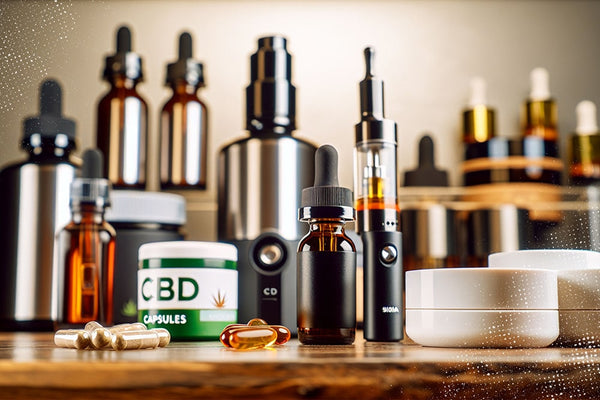
Due to the growing popularity of CBD, there is a notable increase in the variety of CBD products and consumption methods in the market. CBD products come in various forms, including full-spectrum, broad-spectrum, and isolate, each offering unique benefits.
Furthermore, these products can be consumed in several ways, such as oils, capsules, topicals, and vapes, each presenting distinct onset times and effects.
Full Spectrum, Broad Spectrum, and Isolate
CBD products come in three main types:
- Full-spectrum CBD contains all cannabinoids present in the cannabis plant, including up to 0.3% THC, the psychoactive compound.
- Broad-spectrum CBD excludes specific cannabinoids like THC.
- Isolate consists solely of CBD without any other cannabinoids.
The choice between full-spectrum, broad-spectrum, and isolate depends on personal preference, desired effects, and legal considerations.
Although, using full-spectrum CBD products allows for the inclusion of the 'entourage effect', which states that CBD is most effective when all cannabinoids interact symbiotically with each other.
For optimal use of cannabidiol oil we suggest purchasing hemp products that are full-spectrum.
Oils, Capsules, Topicals, and Vapes
CBD can be consumed in several ways, each with its unique properties.
CBD oil, known for its potential to offer pain relief and relaxation without inducing a psychoactive effect, can be taken orally and is absorbed quickly in the bloodstream.
CBD capsules provide a convenient way to consume CBD, though they typically have a slower onset of action compared to cbd oils or vapes.
CBD gummies offer an approachable way to take CBD, and offer a significant reduction in the potential stigma associated with CBD use.
Topical CBD-infused products such as oils, lotions, and creams can be particularly effective in treating localized skin conditions.
Vaping CBD offers rapid absorption into the bloodstream, with effects manifesting within a few minutes and lasting for several hours. Although, vaping is considered one of the more harmful methods of CBD consumption.
Dosing Guidelines
The variability in individual response makes determining the appropriate dosage of CBD a challenging task.
The recommended starting dosage may range from 5mg to 50mg per day, but it’s advisable to start with a lower dose and progressively increase it until the desired effects are attained.
Factors to consider when determining the suitable CBD dosage include:
- The concentration of CBD in the product
- Body weight and height
- Existing medical conditions
- Tolerance level
- Desired effects
- The type of CBD extract
- The mode of administration
It’s crucial to monitor the effects of CBD and adjust the dosage based on individual response, under the guidance of a healthcare provider.
Legal Status and Regulation

The complex legal landscape of CBD varies between countries and even within states. The 2018 Farm Bill legalized hemp-derived CBD on a federal level in the United States, but rapidly changing state laws with products that contain high doses of other cannabinoids may still restrict its use.
Furthermore, the FDA does not regulate CBD supplements, raising concerns about the quality control of CBD products.
2018 Farm Bill and State Laws
The 2018 Farm Bill, also known as the Agriculture Improvement Act, had a significant impact on the legal status of CBD in the United States.
The law legalized the cultivation, processing, marketing, and sale of hemp and its derivatives, including CBD.
Some states deem the use or possession of any cannabis-derived product, including medical marijuana, unlawful, while others have sanctioned CBD with specific limitations.
FDA Regulation and Quality Control
The FDA does not regulate CBD like traditional medications, which raises concerns about the safety and purity of dietary supplements, such as CBD oil. This lack of regulation allows unregulated and often mislabeled products to enter the market, posing potential risks to consumers.
In response to these concerns, the FDA has determined that a new regulatory pathway is necessary to establish safeguards and oversight for managing and mitigating risks associated with CBD products.
Tips for Choosing and Using CBD Products
Ensuring the quality and safety of CBD products is vital when choosing and using them. Here are some tips to keep in mind:
- Look for products that have undergone third-party testing and come with a certificate of analysis.
- Be wary of misleading claims and false advertising.
- Start with low doses and gradually increase as needed under the guidance of a healthcare provider.
Third-Party Testing and Certificates of Analysis
Third-party testing is instrumental in guaranteeing the quality and safety of CBD products. This testing involves an independent, reputable organization conducting tests to verify the accuracy of the product’s label, ensuring that the product contains the specified ingredients as stated.
A certificate of analysis typically displays information regarding the potency of the CBD, the presence of other cannabinoids, and any potential contaminants that could impact the safety and quality of the product.
Avoiding Misleading Claims
Caution is advised when dealing with companies making disease claims for CBD products, as these may be misleading and unsupported by clinical research. Consumers can discern misinformation or exaggeration in CBD product advertisements by:
- Critically assessing the claims presented
- Exercising caution with products that make specific health promises
- Being skeptical of language that exceeds current scientific evidence
Misleading marketing can erode consumer confidence in the CBD industry and regulatory authorities responsible for safeguarding public health.
Starting with Low Doses and Monitoring Effects
When initiating CBD use, it is recommended to start with a low dose and observe its effects. This allows individuals to evaluate their body’s reaction and adjust the dosage to attain the desired outcome. The recommended initial dosage may range from 5 to 50 mg per day, with individuals advised to incrementally increase the CBD dosage by 5 mg after a week until the desired effects are achieved.
It’s crucial to monitor the effects of CBD and adjust the dosage based on individual response, under the guidance of a healthcare provider.
Summary
In conclusion, CBD, a non-psychoactive compound derived from cannabis, offers potential health benefits such as anxiety and depression relief, pain management, and potential applications in neurological disorders.
However, its usage should be approached with caution until the FDA approves CBD as a dietary supplement and due to potential side effects and interactions with other medications.
The legal landscape and regulation of CBD can be complex, varying between countries and even within states.
When choosing and using CBD products, it’s crucial to ensure their quality and safety, starting with low doses and gradually increasing as needed under the guidance of a healthcare provider.
Ready to fight the Sunday Scaries? Shop our CBD Gummies for Focus, CBD Candy, CBD Treats for Dogs, CBD Gummies, CBD Oil Tinctures, CBD Sleep Oil, Extra Strength CBD Gummies, Delta-9 THC Gummies, CBD Edibles, and Vegan CBD Gummies online today!
Frequently Asked Questions
Is CBD the same as Marijuana?
CBD is not the same as marijuana, as it does not contain THC, the psychoactive ingredient in marijuana that causes a high. It interacts with different receptors and does not produce the same psychoactive effects.
Is CBD used as a drug?
CBD is used as a prescription drug for seizures disorder (epilepsy), but there is no strong scientific evidence to support its use for other conditions.
Does CBD make you feel spacey?
No, CBD oil does not make you feel "spacey" as it is non-psychoactive and does not produce the high associated with THC. However, some users may experience slight differences in how they feel after consumption, but this can vary from person to person.
Is CBD Legal in all states?
Yes, CBD is federally legal in all 50 states after the 2018 Farm Bill was signed into law.
What's the Best Way to Consume CBD?
The best way to consume CBD is either in gummy or oil form. To find the ideal choice for your wellness routine, check out our resource: CBD Oil vs. Gummies

 CBD Gummies
Stress Relief
CBD Gummies
Stress Relief
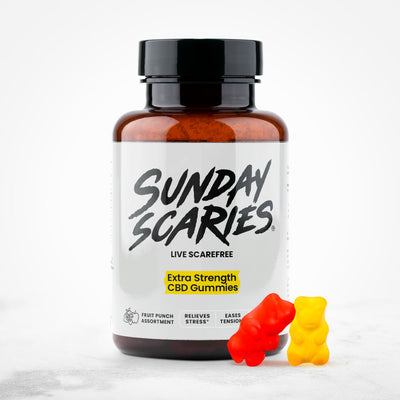 Extra Strength CBD Gummies
Stress Relief
Extra Strength CBD Gummies
Stress Relief
 Vegan CBD Gummies
Stress Relief
Vegan CBD Gummies
Stress Relief
 CBD Gummies for Focus
Focus Boost
CBD Gummies for Focus
Focus Boost
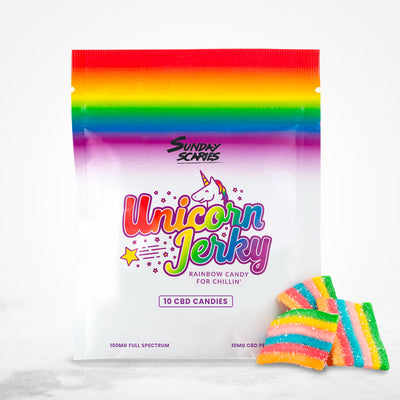 CBD Candy
Mood Lift
CBD Candy
Mood Lift
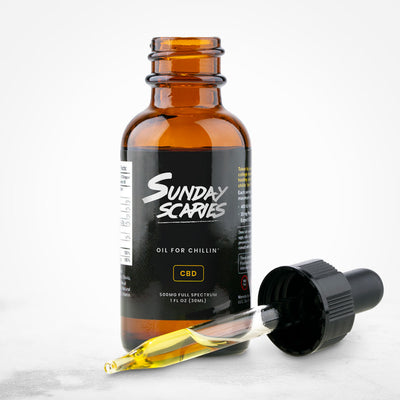 CBD Oil Tinctures
Stress Relief
CBD Oil Tinctures
Stress Relief
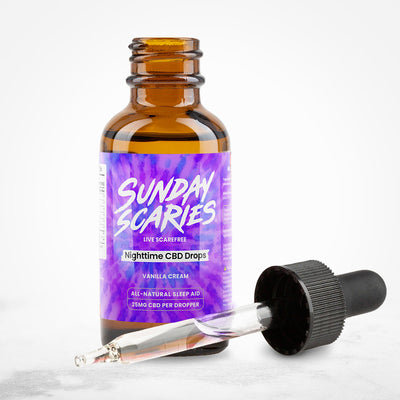 CBD Sleep Oil
Sleep Aid
CBD Sleep Oil
Sleep Aid
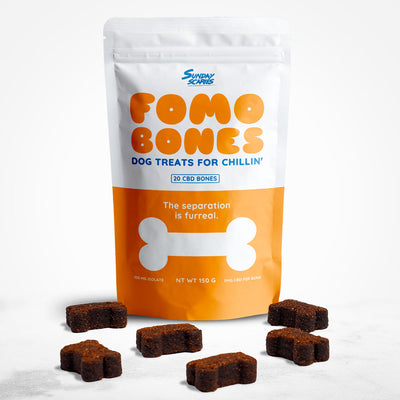 CBD Dog Treats
Stress Relief
CBD Dog Treats
Stress Relief
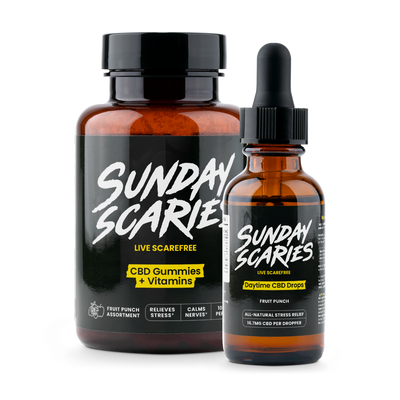 Side Piece Bundle
Stress Relief
Side Piece Bundle
Stress Relief
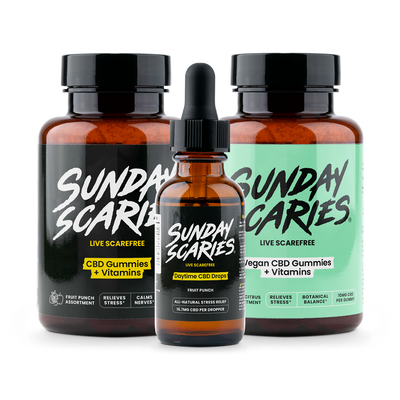 Rando Bundle
Rando Bundle
 Delta-9 THC Gummies
Euphoria
Delta-9 THC Gummies
Euphoria
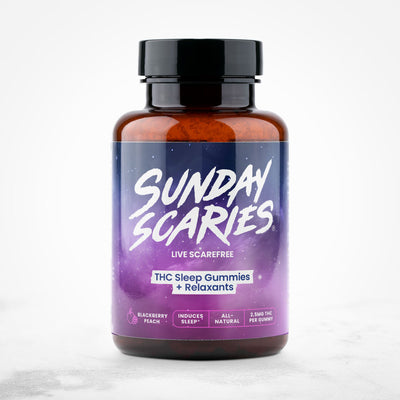 THC Gummies for Sleep
Sleep Aid
THC Gummies for Sleep
Sleep Aid
 Sunday Scaries® Snapback
Sunday Scaries® Snapback
 Sunday Scaries Shirt
Sunday Scaries Shirt
 Sunday Scaries Sweatshirt
Sunday Scaries Sweatshirt
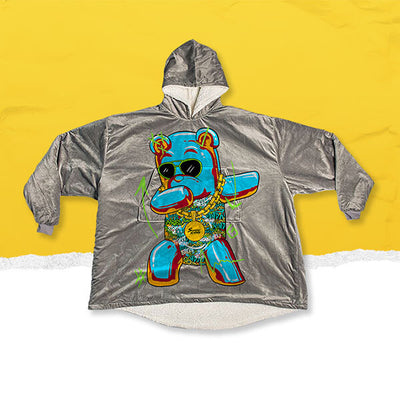 Dabbing Bear Blanket Jacket
Dabbing Bear Blanket Jacket



